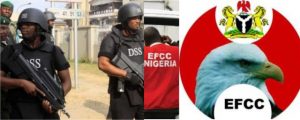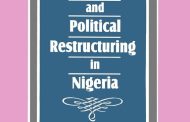 The obvious estrangement between intelligence agencies in Nigeria expanded yesterday with the Economic and Financial Crimes Commission, (EFCC) calling to question the quality of intelligence by the Directorate of State Security Service, (DSSS). In a move that still surprises, the EFCC referred to DSSS intelligence on a particular case as market place stuff. Although DSSS report is the basis or peg for the rejection of Ibrahim Magu by the Senate as EFCC Chairperson, it was not known the relationship between the two had degenerated to where one would describe the other’s information as Dugbe Market class, Dugbe market being but a big, open market where anybody can say anything and evidence or proof is not vital.
The obvious estrangement between intelligence agencies in Nigeria expanded yesterday with the Economic and Financial Crimes Commission, (EFCC) calling to question the quality of intelligence by the Directorate of State Security Service, (DSSS). In a move that still surprises, the EFCC referred to DSSS intelligence on a particular case as market place stuff. Although DSSS report is the basis or peg for the rejection of Ibrahim Magu by the Senate as EFCC Chairperson, it was not known the relationship between the two had degenerated to where one would describe the other’s information as Dugbe Market class, Dugbe market being but a big, open market where anybody can say anything and evidence or proof is not vital.
In this case, it is not the specific point of disagreement between the two agencies which is the trail of Kingsley Kuku, an adviser to former President Goodluck Jonathan on the Niger Delta Amnesty programme but a case of open quarrel between agencies whose operations outsiders rarely ever knew anything about in terms of technical details. The EFCC, unlike the classical spy agencies, can celebrate its achievements, its mode of work is no less the stuff of secret service trajectory. The open quarrel between it and the DSSS now points to escalation of the conflict, more so when mapped unto the reported frosty relations between the DSSS and the Office of the National Security Adviser, (NSA). Spy agencies have gradually been shedding secrecy and transforming more or less into military police but that is in operational matters, not the kind of open disagreement and rebuttals being witnessed in Nigeria now. for some observers, the clashes signpost a decentered presidency.
But, recently, Bolaji Akinyemi, a professor of International Relations and former Minister for Foreign Affairs of Nigeria had to warn against publishing the report of an on-going probe of the National Intelligence Agency, (NIA) over the Ikoyi loot found. He fears that doing so would amount to standing both NIA operatives and corporate standing naked in the global square. Although Akinyemi did not appear to have taken note of the virtual probe of the CIA, the American equivalent of the NIA over 9/11 ‘intelligence failure’ and over the conduct of Iraqi war, he was nevertheless sounding a note of warning that inter-agency rivalry in the context of the Buhari regime is preparing the ground for a comprehensive overhaul of the intelligence establishment in Nigeria to be inescapable in the post Buhari regime, irrespective of who wins.




























